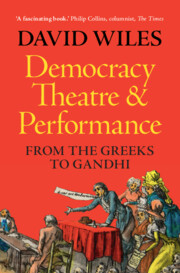Book contents
- Democracy, Theatre and Performance
- Democracy, Theatre and Performance
- Copyright page
- Contents
- Figures
- Acknowledgements
- Introduction
- Chapter 1 Rhetoric in Athens
- Chapter 2 Acting versus Sincerity
- Chapter 3 Puritan Democracy
- Chapter 4 Oratory in the French Revolution
- Chapter 5 American Democracy
- Chapter 6 Democracy as a Universal Good
- Chapter 7 Theatre and Theatrocracy in Democratic Athens
- Notes
- References
- Index
Chapter 6 - Democracy as a Universal Good
Gandhi, Tagore and the New India
Published online by Cambridge University Press: 17 May 2024
- Democracy, Theatre and Performance
- Democracy, Theatre and Performance
- Copyright page
- Contents
- Figures
- Acknowledgements
- Introduction
- Chapter 1 Rhetoric in Athens
- Chapter 2 Acting versus Sincerity
- Chapter 3 Puritan Democracy
- Chapter 4 Oratory in the French Revolution
- Chapter 5 American Democracy
- Chapter 6 Democracy as a Universal Good
- Chapter 7 Theatre and Theatrocracy in Democratic Athens
- Notes
- References
- Index
Summary
To the modern political philosopher Amartya Sen, democracy appears a universal good, but others have seen it as a product of European and American thought bound up with colonialism, and have looked for qualities better attuned to ‘Asian’ values like consensus or the connection of human beings to nature. Gandhi presented himself as a man of transparent truth and integrity, so echoing Socrates, the Christian puritan tradition and (except in regard to violence) Robespierre. He disliked Parliamentary democracy, but needed it in order to secure independence. His encounter with Charlie Chaplin highlights the central problem: Was the Mahatma a staged role that he played, or an expression of his authentic self? Many were impressed, but some like Jinnah and Ambedkar were not. Rabindranath Tagore shared Gandhi’s objections to metropolitan Western-style electoral democracy, but distrusted Gandhi’s authoritarianism. As an artist, Tagore saw performance as an essential feature of human nature. He found no way in which he could himself enter the political arena, and fell back upon being an educator.
Keywords
- Type
- Chapter
- Information
- Democracy, Theatre and PerformanceFrom the Greeks to Gandhi, pp. 145 - 168Publisher: Cambridge University PressPrint publication year: 2024

